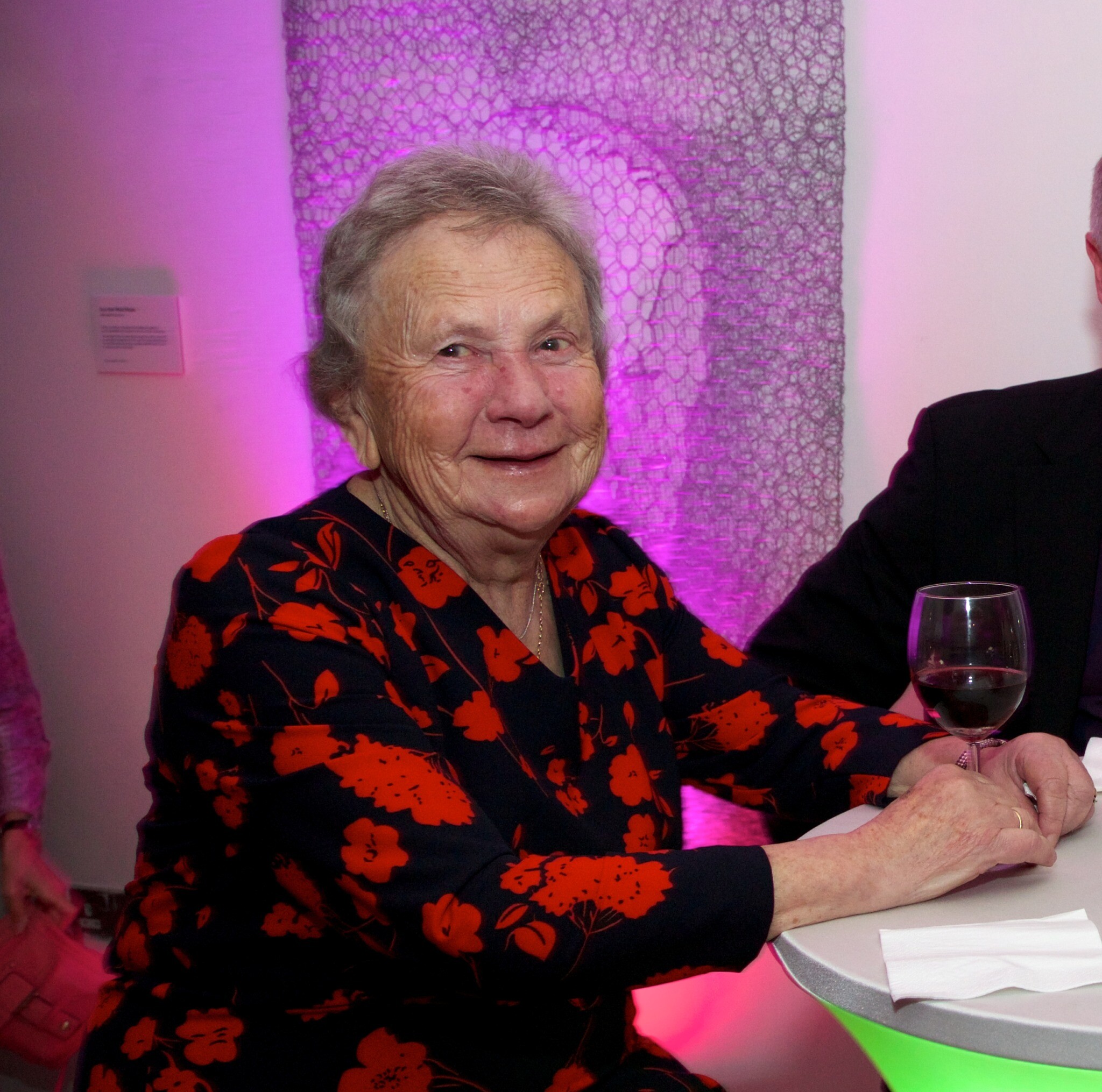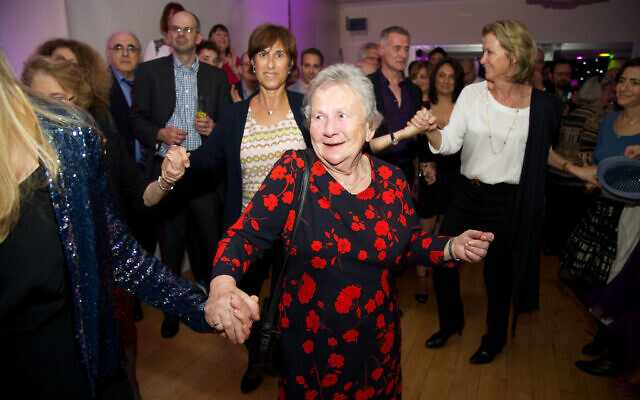OPINION: Against all odds: an epic story of childhood resilience in wartime Poland
As she celebrates her 90th birthday, David Wolchover narrates his cousin’s extraordinary story of survival as a small child in Nazi-occupied Poland.
With all the horrifying accounts from October 7 it may be easy to forget there are still living Holocaust survivors with remarkable stories to tell. One such character is my cousin Sarah “Sue” Tolley, who recently celebrated her 90th birthday.
Many years ago she drafted a memoire of her childhood in wartime Poland which we recently agreed I would adapt for this short article. Over coffee and a delicious home-made sponge in her charming Seven Kings home she enlisted her razor-sharp mind and crystal-clear memory to help me check the details.
As she sat down I noticed a nasty cut on her knee. “Silly me. I had a bit of fall.” I’ve long been used to her wicked sense of humour but her explanation was absolutely in keeping with the intrepid nature she inherited from her mother Gittel. “Running for a bus,” she chortled.
Gittel’s parents were modern secular Jews and all their children were bilingual in Polish and Yiddish. On the death of her father in 1930 her older siblings, long resident in England, brought their mother back with them, leaving Gittel in charge of the family’s dairy farm in the south-eastern Polish market town of Biala Podlaska. In 1937 Gittel’s husband journeyed to England but war came before his wife and daughter could join him.
With the Nazi invasion the Wehrmacht commandeered a small barracks, evicting numerous local residents to provide additional billeting. The farm was exempted because the army got their milk supplies there. Occasionally, a particular officer would himself attend, ostensibly to oversee the daily collection rather than leaving it to a lone squaddie, but Gittel was rather “personable” and looked “very Polish” and through her Yiddish she could speak basic German. The officer told her that if any soldier gave her trouble she should come to him.
His words were prescient. One bedtime in November 1939 Gittel had put a saucepan of milk on the stove when a drunken German burst in brandishing a revolver and roaring, “I hate Poles. First I will kill your daughter, then you!”
Instantly, Gittel flung the boiling milk in the intruder’s face and dashing out into the snow in their night things they took refuge with their Catholic neighbour and good friend Pola Lubanska. Next day plucky Gittel risked contacting the officer who, as good as his word, promised to have the soldier transferred to guard duties at the frontier with Russian-occupied Poland. Sue has often wondered whether the whole episode was cooked up to achieve grateful favours in return. However, before the officer could claim his reward (if that was his plan) he himself was transferred.

Even in those early days of the occupation German troops displayed their arrogance in acts of random barbarity. Sue vividly remembers witnessing a Nazi on horseback taking pot shots at pedestrians, but rather more terrifying for her personally was the time she and Gittel were out walking with their cousin’s wife and baby. Hearing a sudden shout of “Halt!” the young mother panicked and fled, whereupon she and her baby were slaughtered with a single shot. Gittel shoved Sue to the ground, shrieking “Let it be in the head and quick,” but there was no sport in aiming at a stationery target and the brutal marksman walked off.
Gittel nonetheless considered it generally safe enough to let Sue out on her own and she certainly had time on her hands since the Nazis had seized the teacher of the small Jewish infants’ school in which she had enrolled on turning six. Gittel now became her evening tutor but during the day Sue would sometimes stroll over to visit her aunt and uncle. She was having lunch with them one day when an SS unit arrived in the street, tasked with rounding up Jewish men. Her uncle promptly leapt out of the rear window but moments later a German thrust open the unlocked front door. Sue was behind it and through the gap between the door and the frame she saw him enter.
To help me clarify the scene, we stepped into Sue’s dining-room where, using the layout and dimensions, I sought to establish exactly what happened. Watching her re-live the episode referencing a familiar living space was eerie, to say the least. Seeing the open window on such a cold day and evidently guessing that a man had just escaped, the brave warrior opened fire and then left. Fearing the worst Sue peered from behind the door to see her very pregnant aunt lying motionless, eyes staring lifelessly and blood spreading from the centre of her chest. Had Sue not fortuitously been concealed by the door she would have met the same fate. With no one else to assist she had to help her mother bury her aunt in the Jewish cemetery. Some rite of passage for a six-year old.

Gittel was to prove her feistiness again. In late 1940 a feldwebel came to collect the day’s milk supply and tried to hit on her. With consummate tact Gittel deftly put him off, but to salve his pride he sneered that he would rather hang himself than marry a Polish woman. To this she sweetly retorted, “Why don’t you hang yourself anyway?” That evening, still smarting, he turned up at the farmstead drunk and tried to prise open the heavy back door with his bayonet.
Each time he pushed it through the gap Gittel pressed the tip back with a frying pan. The alcohol had evidently sapped his strength and she managed to shut the door against the latch and bolt it. While he was dithering outside they got dressed and escaped through the bedroom window, running across to Pola’s house. Gittel knew she had to go on the run and left Sue in Pola’s care. In case the vengeful sergeant was still looking for them Pola hid Sue in a tiny concealed space in the loft for a few days, only letting her out to stretch or to use the toilet.
The forged papers identified Gittel as Zofia Jarosiewicz and Sue as Irina Anna, Roman Catholics. They acquired a Christian bible in Polish and two rosaries and took the train to Warsaw.
After six weeks Gittel returned. Sue was overjoyed but shocked at how she had aged and lost weight. To the end of her life Gittel never talked about her time away. They returned to the farmstead. The cows and their horse had gone but a few chickens were still left and Sue helped her mother cultivate their market garden. Her beautiful Seven Kings garden is testament.
It was now the spring of 1941 and Sue had turned seven. The last Jews in town were ordered to move into the new ghetto next to the synagogue, although they were allowed out subject to a 6pm curfew. They had to wear the yellow star on an armband, which Gittel would remove on their way to the farmstead, where she would dig potatoes assisted by Sue when not reading or doing her lessons.
In the autumn, the corner shop owner offered to buy the farmstead and obtain false papers identifying Gittel and Sue as gentiles. Gittel was reluctant to sell and it was agreed instead that she would lease it to him. Shortly afterwards the ghetto and the synagogue were destroyed by fire and Pola’s tiny shed became their secret shelter until the documents were ready.
The captive women were escorted to a holding centre where Gittel learnt that young children could not accompany their mothers to Germany.
The forged papers identified Gittel as Zofia Jarosiewicz and Sue as Irina Anna, Roman Catholics. They acquired a Christian bible in Polish and two rosaries and took the train to Warsaw. As they left the terminus they walked straight into a round-up of women destined for slave labour in Germany. Gittel took pity on a girl of about 14 who was tearfully fretting that her mother would be worried, and she told the girl to stay with them. It was now that Gittel proved her ingenuity.
The captive women were escorted to a holding centre where Gittel learnt that young children could not accompany their mothers to Germany. Pondering for only a moment she teld Sue to stay out of the way and took the 14 year old through to one of the processing rooms.
Showing Sue’s identity card she obtained an authority “for my daughter Irina here to travel with me.” She then took Sue into another room where she showed the harassed clerk the 14-year-old’s identity card and explained that “this little girl” (Sue) had become separated from her mother.
They were transported in packed cattle trucks to the industrial complex at Buchenwald where they ended up in a dormitory containing 24 bunk-beds and were given a blanket and a bowl and a “supper” of soup and black bread.
Without scrutinising the card he gave Gittel an unnamed child’s exit pass. They returned to the 14-year-old to whom Gittel handed the exit pass and with tearful thanks the girl left. The trick worked because many wartime identity cards in Poland did not require a photograph and harassed officials rarely checked the dates of birth of children. Sue, aged 7, was now going to have to pass as a diminutive 14 year-old.
They were transported in packed cattle trucks to the industrial complex at Buchenwald where they ended up in a dormitory containing 24 bunk-beds and were given a blanket and a bowl and a “supper” of soup and black bread. At 6am the women were escorted to a factory to start their training in manufacturing munitions.
Forgetting Gittel’s instruction to stay out of sight Sue went to sit outside where a guard noticed her and asked what she was doing in the camp. To work, she replied. “How old are you?” “Fourteen,” answered 7-year-old Sue. “Come, come, now,” he guffawed, “you’re a bit too small for 14. How old are you really?” “All right, I’m 12.” “That’s more like it,” he laughed.
At bedtime most of the women in the dormitory would kneel in prayer. Gittel did the same, pretending to pray silently while twisting her rosary and genuflecting. Most of Sue’s neighbourhood pals were gentiles and in the course of their playing she had learnt to parrot Christian prayers. It was a life-saver. Instinctively, she prayed loudly enough to distract the other women from her mother’s silence.
While Gittel worked in the factory Sue’s job was to peel potatoes and run errands for the guards. After liberation they were eventually brought to England, where Sue attended Hasmonean Girls’ School and later married Malcolm “Mac” Tolley.
- David Wolchover is a barrister

Thank you for helping to make Jewish News the leading source of news and opinion for the UK Jewish community. Today we're asking for your invaluable help to continue putting our community first in everything we do.
For as little as £5 a month you can help sustain the vital work we do in celebrating and standing up for Jewish life in Britain.
Jewish News holds our community together and keeps us connected. Like a synagogue, it’s where people turn to feel part of something bigger. It also proudly shows the rest of Britain the vibrancy and rich culture of modern Jewish life.
You can make a quick and easy one-off or monthly contribution of £5, £10, £20 or any other sum you’re comfortable with.
100% of your donation will help us continue celebrating our community, in all its dynamic diversity...
Engaging
Being a community platform means so much more than producing a newspaper and website. One of our proudest roles is media partnering with our invaluable charities to amplify the outstanding work they do to help us all.
Celebrating
There’s no shortage of oys in the world but Jewish News takes every opportunity to celebrate the joys too, through projects like Night of Heroes, 40 Under 40 and other compelling countdowns that make the community kvell with pride.
Pioneering
In the first collaboration between media outlets from different faiths, Jewish News worked with British Muslim TV and Church Times to produce a list of young activists leading the way on interfaith understanding.
Campaigning
Royal Mail issued a stamp honouring Holocaust hero Sir Nicholas Winton after a Jewish News campaign attracted more than 100,000 backers. Jewish Newsalso produces special editions of the paper highlighting pressing issues including mental health and Holocaust remembrance.
Easy access
In an age when news is readily accessible, Jewish News provides high-quality content free online and offline, removing any financial barriers to connecting people.
Voice of our community to wider society
The Jewish News team regularly appears on TV, radio and on the pages of the national press to comment on stories about the Jewish community. Easy access to the paper on the streets of London also means Jewish News provides an invaluable window into the community for the country at large.
We hope you agree all this is worth preserving.






















